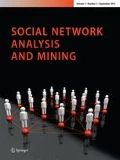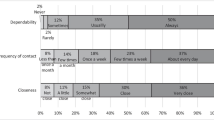Abstract
In this study, a social support framework was adopted to investigate the structure and makeup of the social support networks of underrepresented minority (URM) graduate students at predominantly white institutions (PWIs). Support networks are a critical need for URM students, especially at PWIs. Graduate students from URM groups face isolation, hostility, and estrangement in environments where they are excluded and minoritized, leading to high dropout rates. Low degree attainment is catastrophic for the scientific community as it loses diverse perspectives from entire groups of academic scholars. This study focuses on the social support networks of sixteen Black/African American and Hispanic/Latino/a/x graduate students as they persisted through graduate school at three different PWIs. Three social networking surveys were used to collect data about their network composition, and six interviews provided qualitative data about specific personal experiences related to their support networks. The combination of this data is critical to the analysis of their support networks as they persisted through their graduate programs to help future graduate students from URM groups at other PWIs. By knowing the composition of persisting URM graduate students’ social support networks and their personal experiences, institutions can emphasize the importance of having support networks and provide opportunities to form and strengthen support networks.

Similar content being viewed by others
References
Allen W (1985) Black student, white campus: structural, interpersonal, and psychological correlates of success. J Negro Educ 54(2):134–147
Allen W (1992) The color of success: African-American college student outcomes at predominantly white and historically black public colleges and universities. Harv Educ Rev 62(1):26–45. https://doi.org/10.17763/haer.62.1.wv5627665007v701
Barrera M (1986) Distinctions between social support concepts, measures, and models. Am J Community Psychol 14:413–445
Borgatti SP, Everett MG, Johnson JC (2013) Analyzing social networks. Sage, London
Byars-Winston A, Estrada Y, Howard C, Davis D, Zalapa J (2010) Influence of social cognitive and ethnic variables on academic goals of underrepresented students in science and engineering: a multiple-groups analysis. J Couns Psychol 57(2):205–218. https://doi.org/10.1037/a0018608
Campbell P (2018) Science benefits from diversity. Nature. https://doi.org/10.1038/d41586-018-05326-3
Christakis NA, Fowler JH (2010) Connected: the amazing power of social networks and how they shape our lives. Sage, London
Cohen S, Gottleib B, Underwood L (2000) Social relationships and health: challenges for measurement and intervention. Oxford University Press, New York
Cole D, Espinoza A (2008) Examining the academic success of latino students in science technology engineering and mathematics (STEM) majors. J Coll Stud Dev 49(4):285–300
Crossley N, Bellotti E, Edwards G, Everett MG, Koskinen J, Tanner M (2015) Social network analysis for Ego-nets. Sage, London
DeFour DC, Hirsch BJ (1990) The adaptation of Black graduate students: A social network approach. Am J Community Psychol 18:487–503
Dika SL (2012) Relations with faculty as social capital for college. J Coll Stud Dev 53(4):596–610
Everett M, Borgatti SP (2005) Ego network betweenness. Soc Netw 27(1):31–38. https://doi.org/10.1016/j.socnet.2004.11.007
Gage-Bouchard EA, LaValley S, Panagakis C, Shelton RC (2015) The architecture of support: the activation of preexisting ties and formation of new ties for tailored support. Soc Sci Med 134:59–65
Gardner SK, Barnes BJ (2007) Graduate student involvement: socialization for the professional role. J Coll Stud Dev 48(4):369–387
Gibbs KD Jr, McGready J, Bennett JC, Griffin K (2014) Biomedical science Ph.D. career interest patterns by race/ethnicity and gender. PLoS ONE 9(12):e114736. https://doi.org/10.1371/journal.pone.0114736
Gloria AM, Castellanos J, Lopez AG, Rosales R (2005) An examination of the academic nonpersistence decisions of Latino undergraduates. Hisp J Behav Sci 27(2):202–223
Gloria AM, Robinson K, Hamilton K, Willson M (1999) African American students' persistence at a predominantly White university: influences of social support, university comfort, and self-beliefs. J Coll Stud Dev 40(3)
Gloria AM, Rodriguez ER (2000) Counseling Latino university students: psychosociocultural issues for consideration. J Couns Dev 78(2):145–154
Gottlieb BH, Bergen AE (2010) Social support concepts and measures. J Psychosom Res 69(5):511–520. https://doi.org/10.1016/j.jpsychores.2009.10.001
Grandy J (1998) Persistence in science of high-ability minority students: results of a longitudinal study. J Higher Educ 69(6):589–620
Grossett BJ, Cuyjet MJ, Cockriel J (1998) African Americans’ perception of marginality in the campus culture. Coll Stud J 32:22–32
Harper SR (2006) Peer support for African American male college achievement: beyond internalized racism and the burden of “acting White.” J Men Stud 14:337–358
Hernandez JC (2000) Understanding the retention of Latino college students. J Coll Stud Dev 41:575–586
Hernandez JC, Lopez MA (2004) Leaking pipeline: issues impacting Latino/a college student retention. J Coll Stud Retent 6(1):37–60
Hodapp T, Brown E (2018) Making physics more inclusive. Nature 557:629–632. https://doi.org/10.1038/d41586-018-05260-4
Huang G, Taddese N, Walter E (2000) Entry and persistence of women and minorities in college science and engineering education. (NCES 2000–601). Washington, DC
Kadushin C (2012) Understanding social networks; theories, concepts, and findings. Oxord University Press, New York
Kimbrough RM, Molock SD, Walton K (1996) Perception of social support, acculturation, depression, and suicidal ideation among African American college students at predominantly Black and predominantly White universities. J Negro Educ 65:295–307
Korstjens I, Moser A (2018) Series: Practical guidance to qualitative research. Part 4: trustworthiness and publishing. Eur J Gen Pract 24(1):120–124. https://doi.org/10.1080/13814788.2017.1375092
Lincoln SY, Guba EG (1985) Naturalistic inquiry. Sage, Thousand Oaks
Lumino R, Ragozini G, Vitale MP (2016) Investigating social support patterns of single mothers from a social network perspective. Int Rev Soc Res 6(4):182–194. https://doi.org/10.1515/irsr-2016-0021
Marsden P (1988) Homogeneity in confiding relations. Soc Netw 10:57–76
McPherson M, Smith-Lovin L, Cook JM (2001) Birds of a feather: homophily in social networks. Annu Rev Soc 271(1):30
Museus SD (2008) The role of ethnic student organizations in fostering African American and Asian American students’ cultural adjustment and membership at predominantly White institutions. J Coll Stud Dev 49:568–586
National Science Board (2008) Science and engineering indicators 2008. Arlington, VA
National Science Foundation (2019) Women, minorities, and persons with disabilities in science and engineering. Alexandria, VA https://ncses.nsf.gov/pubs/nsf19304/digest/field-of-degree-minorities#degrees-earned-by-underrepresented-minorities
Perry BL, Pescosolido BA, Borgatti SP (2018) Egocentric network analysis; foundations, methods and models. Cambridge University Press, Cambridge
Powell K (2018) These labs are remarkably diverse: here’s why they’re winning at science. Nature 558:19–22. https://doi.org/10.1038/d41586-018-05316-5
Prell C (2012) Social network analysis: history, theory and methodology. Sage, London
Sailes GA (1993) An investigation of Black student attrition at a large, predominantly White, Midwestern university. West J Black Stud 17:179–182
Tinto V (1975) Droupout from higher education: a theoretical synthesis of recent research. Rev Educ Res 45:89–125
Waldeck JH, ROrrego VO, Plax TG, Kearney P (1997) Graduate Student/faculty mentoring relationships: who gets mentored, how it happens, and to what end. Commun Q 45(3):93–109
Wellman B, Wortley S (1989) Brothers’ Keepers: situating kinship relations in broader networks of social support. Sociol Perspect 32:273–306
Wellman B, Wortley S (1990) Different strokes from different Folks: community ties and social support. Am J Sociol 96:558–588
Williams SN, Thakore BK, McGee R, Price R (2017) Providing social support for underrepresented racial and ethnic minority PhD students in the biomedical sciences: a career coaching model. CBE Life Sci Educ. https://doi.org/10.1187/cbe.17-01-0021
Acknowledgements
This material is based upon work supported by the National Science Foundation under Grant No. 1309055. Any opinions, findings, and conclusions or recommendations expressed in this material are those of the author(s) and do not necessarily reflect the views of the National Science Foundation.
Author information
Authors and Affiliations
Corresponding author
Ethics declarations
Conflict of interests
The authors declare that there is no conflict of interest.
Additional information
Publisher's Note
Springer Nature remains neutral with regard to jurisdictional claims in published maps and institutional affiliations.
Rights and permissions
About this article
Cite this article
Tullis, K.A., Grunert Kowalske, M. The composition of social support networks of URM graduate students at predominantly white institutions. Soc. Netw. Anal. Min. 11, 90 (2021). https://doi.org/10.1007/s13278-021-00793-5
Received:
Revised:
Accepted:
Published:
DOI: https://doi.org/10.1007/s13278-021-00793-5




